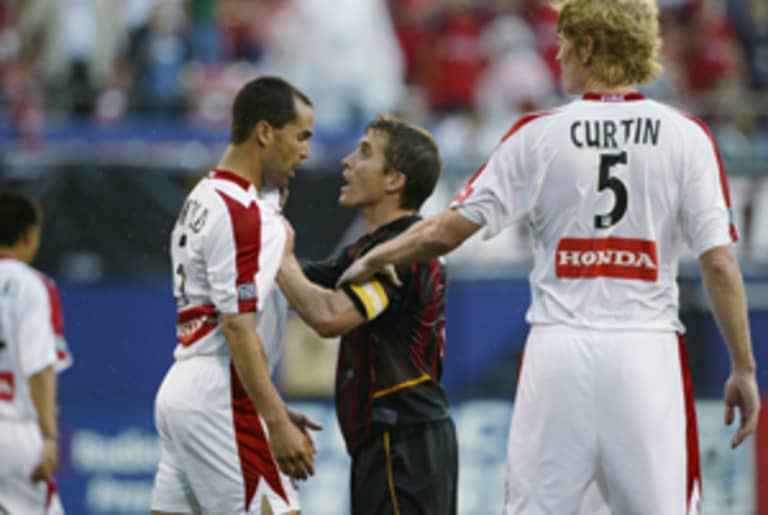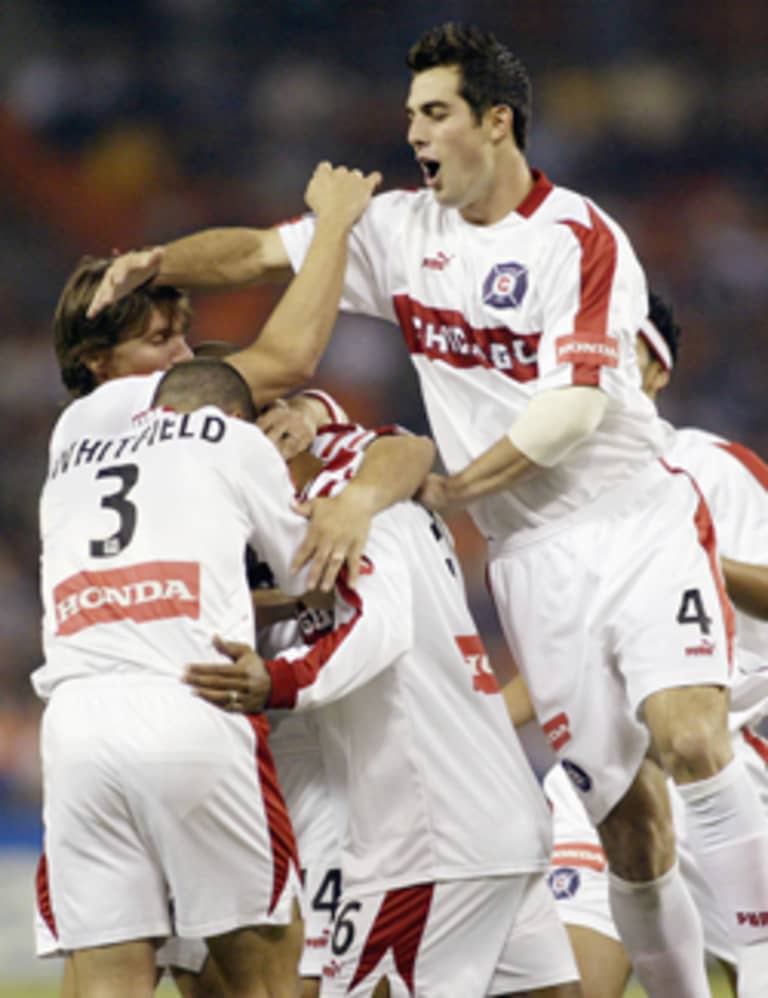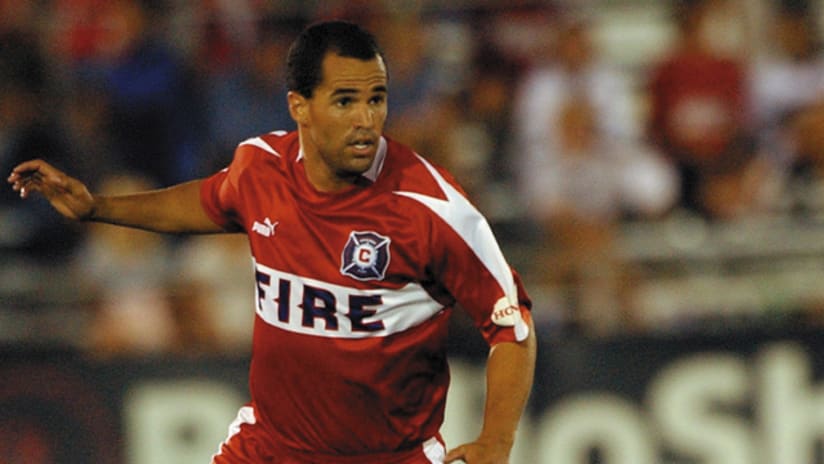The day before the
club’s 2011 Opening Day match last month a familiar face joined the Fire
broadcast team. Evan Whitfield spent five seasons playing for the Chicago Fire,
tasting some of the club’s greatest successes as well as some of the most
difficult defeats. One of only 12 players to appear in 100 or more games for
the Fire, Whitfield helped the club to two Lamar Hunt U.S. Open Cup
championships in 2000 and 2003 and was a member of the 2000 U.S. Olympic team
in Sydney.
Now a Chicago-based
attorney by day, Jeff Crandall sat down with the former Fire player to discuss
his new role as the club’s Color Analyst, teaming with Play-by-Play Announcer
Dan Kelly and Sideline Reporter Oscar Guzman on the Fire’s regional broadcasts
this season.
Jeff Crandall: How’d you come into your new role with the
Fire?
Evan Whitfield:
Right around the holiday season the Fire reached out to me and said that the
team was looking to revamp the broadcast. My name had come up a few times
apparently. I said that I was flattered and interested and we scheduled a time
to meet with Andrew [Hauptman]. During that meeting we discussed my
broadcasting philosophy, how I envisioned the broadcast going and just my
general thoughts about soccer and the Fire.
After that I did a test with Dan Kelly…
JC: …and then one day someone here called and
said ‘You’re hired’
EW: (Laughs) Yeah! That was basically it.
JC:So you mentioned “broadcast philosophy”…
What is yours exactly?
EW: The thing that I talked about most with Andrew was just, with all due respect to former broadcasters, regardless of what broadcast you’re watching, a lot of times the broadcast seems to be geared towards novice or part-time viewers. The play-by-play guy is using generic soccer terms and the color analyst is explaining the rudimentary things about soccer. Stuff like, ‘The referee has his hand up in the air, which indicates a direct kick, which means the ball has to touch two or more players before traveling across the goal line’…. Everyone’s so painfully aware that soccer in the United States is this small fire that needs constant kindling and care and they’re always gearing themselves towards that.

The fact of the matter is that the person who is going to
sit down and watch an entire game isn’t a first-time viewer. They’re someone
that really likes soccer, they most likely played as a youth or in high school
or college. They know enough about the game to not have to hear the rules every
time they tune into a broadcast.
My thought process was to bring just my professional playing
experience and however many years of soccer I’ve watched and give a more
authentic and in-depth analysis of what’s going on the field tactically or
technical things the players are doing that are difficult or exciting. It’s
just a deeper level of analysis from what had been going on and is still going
on in some broadcasts in this country.
JC: You had your debut in the home opener on
March 26. How did you feel?
EW: I was impressed by the number of people
that are involved in the production. Everybody at My50, in the truck, the
producer, the camera people, the coordinator in the booth with us, the people
on the Fire’s end. I was impressed by that group of like 30 people that were
coordinating everything and getting things going. That was a total shock to me.
Other than that, the broadcast was a little nerve-wracking at first. As the
minutes went by and got more and more comfortable. By halftime I felt really
good and by the second half, I was fine.
JC:Moving away from your new career in
broadcasting, you actually played for the club from 1999-04. What are your
memories from your playing days with the Fire?
EW: My on-field
memories are just playing with Lubos Kubik. Playing with someone like Lubos was
pretty special. Training and playing with Peter Nowak everyday was a huge
memory. I don’t know, special moments, you think about the highlights: U.S.
Open Cup in 2000 and 2003, our two losses in MLS Cup those years…It’s always
fun to get there but losing is kind of a nightmare. Just generally, the great
players that played there: Chris Armas, Lubos, Nowak, playing with Zach
[Thornton], Ante Razov was a really good forward.

The other striking thing for me and one that I didn’t think
about until I went and watched training earlier this season was the guys
kicking the balls around before hand, giggling and telling stories. The
camaraderie of the team was something I’d almost forgotten about. That brought
back a lot of those memories of just dealing with all the players you don’t
even remember who were on the Fire. Guys like Andrew Lewis , Henry Ring and
Ryan Futagaki!
JC: Speaking of camaraderie, what do you think
of the camaraderie on the current Fire team?
EW: One thing I
will say is that it’s a misnomer – a lot of people who aren’t in sports think
that you have to like the people that you play with in order to have chemistry.
I will say from first-hand experience that’s not true.
What you do have to have is a respect for them. When you
have respect for another player then you’re willing to work for them. I had a
lot of great friends on the Fire – Jesse Marsch and I are still good friends,
CJ Brown. There are plenty of players on the team that you weren’t friendly
with but the level of respect you had for them just demanded that you worked
together.
Obviously if you like someone it’s easy to work with them
and you can see that, it makes it all the better. Watching the team now and
obviously I’m not in the locker room, but because everyone’s working so hard on
the field, I see how it would be easy to work with this team and for this team.
When you see your two forwards tracking back and winning
balls and turning around to charge back up the field again, when you’re a
defender it makes you want to work that much harder. As opposed to a forward
that can’t score that’s walking around with his hands on his hips all day.
CLICK HERE FOR PART TWO OF JEFF CRANDALL'S Q&A WITH EVAN WHITFIELD


